
Education Beat: Schools board postpones closures after 30 speakers plead to keep Pierce, ALA open; district released from State-imposed Emergency Finance Plan
By Harold C. Ford
A six-hour meeting of the Flint Board of Education (FBOE) on May 11 began with purported good news that Flint Community Schools (FCS) had been released from the imposition of an enhanced deficit elimination plan (EDEP) by the Michigan Department of Treasury.
But any euphoria elicited by the EDEP-dismissal announcement quickly evolved into a parade of FCS constituents anxiously and unanimously urging the district not to close schools – specifically Pierce Elementary and the Accelerated Learning Academy.
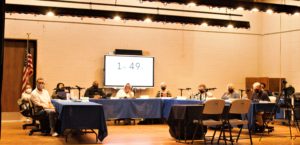
The Flint Board of Education listen to members of the public speak during Wednesday’s meeting. (Photo by Tom Travis)
The long meeting eventually devolved into an all-too-familiar row, this one featuring the FBOE president and vice president.
EDEP disappears, not so indebtedness
“I received a call from Treasury (Michigan Department of Treasury) yesterday,” said Kevelin Jones, FCS superintendent, at the start of the May 11 FBOE meeting. “In that call, Treasury let me know that our district will no longer need to submit an enhanced deficit elimination plan.”
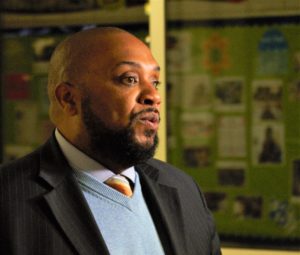
Flint Community Schools Superintendent Kevelin Jones. (Photo by Tom Travis)
Jones’ announcement generated three rounds of smiles and applause by FBOE members. “This means … the state won’t be looking over our shoulder,” he said.
The district had been under the watchful eye of Michigan’s state government – specifically its Department of Treasury – for many years. Most recently, two amended EDEPs were sent to Treasury by FCS in calendar year 2020.
“This doesn’t mean Flint doesn’t have a deficit,” Jones cautioned.
Jones’ caution has often been expressed by others:
- “The district projects to remain in deficit until Fiscal Year 2035-36.” –Michigan Department of Treasury, Sept. 2020
- “You’re definitely not going to be in excellent financial shape for a long time.” –Holly Stefanski, assurance manager, Plante Moran, an auditing firm then serving FCS, Jan. 2022
- “This (COVID relief funding) gives us the appearance that we are not operating in a deficit. I want to stress … we are still in a deficit.” –Ayunnah Dompreh, then-FCS director of finances, Feb. 2022
ESSER funds provide temporary solvency
Jones said dismissal of the EDEP “is due to the work that the district has done as it pertains to our ESSER (Elementary and Secondary School Relief/ COVID relief) funds and having a fund balance. We are in a position that our fund balance is in a space where we need to be at the time.”
The positive FCS “fund balance” is achieved, temporarily, by ESSER funds from the federal government that total $144 million, an amount confirmed by Keiona Murphy, FCS assistant superintendent.
“We still need board members to eliminate some debt,” Jones warned. “We still need to make sure we are fiscally responsible.”
Representatives of Plante Moran advised the FBOE in Dec. 2021 that unless affirmative measures were undertaken to address systemic shortcomings – particularly declining student enrollment – by 2024 FCS would likely circle back to a familiar bleak financial profile that has existed for nearly two decades.
Drains and gains
Powerful forces – both negative (resource drains) and positive (resource gains) impact the economic profile of Flint community schools. Some, not all, are outlined below.
Drains
- FCS has experienced significant loss of students and resultant aid from the state of Michigan at $8,000 to $9,000 per student. About 25 percent of students that reside in Flint attend Flint’s public schools. “We’ve got over 12,000 students,” decried Joyce Ellis-McNeal, FBOE president, at the May 11 meeting. “They’re just not in our schools.” At the same meeting, FBOE Treasurer Laura MacIntyre confirmed that the FCS student count is, at present, about 3,000. That means that about 9,000 Flint youngsters do not attend FCS schools. Thus, simple math reveals that, FCS is losing $72 million to $81 million annually in state aid due to loss of students. Frequent hopeful statements aside, the FBOE has offered no evidence that Flint’s youth will return to their schools.
- Aging buildings and infrastructure sap the district’s financial resources. The collective age of Flint’s 11 buildings is just shy of eight centuries. Infrastructure needs – HVAC systems (heating, ventilation, air conditioning), electrical grids, hydration stations/water fountains, internet capabilities, plumbing, athletic facilities – constantly drain FCS resources. Representatives of Plante Morane Cresa, an auditing firm that specializes in real estate, recently told the FBOE the district would need $174 million in the next decade to properly maintain the 11 buildings that currently house its students. A several hundred-million-dollar plan spearheaded by the Flint-based Mott Foundation that would renovate or rebuild all FCS buildings – first revealed by East Village Magazine (EVM) over a year ago in April 2021 – has yet to appear on any public agenda of the FBOE.
- Legacy debt from the past includes paying off an approximate $20 million loan taken out by the district in 2014 and some benefits for FCS retirees.
Gains
- The infusion of $144 million in federal ESSER funds has temporarily boosted the FCS financial profile by establishing the aforementioned positive “fund balance.”
- A 25-year $30 million fiscal stability bond, passed by Flint voters in March 2020, provides some day-to-day operational revenue and helps pay off some of the district’s legacy debt.
Five FCS schools honored
In his opening comments, Jones also announced that five Flint schools had been honored as “Capturing Kids’ Hearts Showcase Schools,” a national-level award. Awardees were: Potter Elementary; Brownell Elementary; Freeman Elementary; Accelerated Learning Academy (ALA), and Pierce Elementary. More smiles and more applause ensued.

Pierce Elementary School (Photo by Tom Travis)
But the celebratory mood lasted only minutes as more than thirty speakers paraded to the microphone to comment on the reported pending closures of the ALA (formerly Scott) and Pierce buildings.
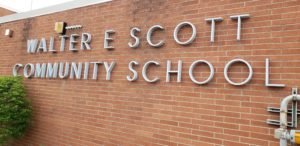
Walter Scott Community School houses the Accelerated Learning Academy on Flint’s east side. (Photo by Tom Travis)
“To close or not to close?”
Jones said “two of our schools (are) in consideration of closure.” He was referencing reports and rumors about the possible closures of the district’s Pierce and ALA buildings.
One day prior to the FBOE meeting, on May 10, WNEM Channel 5 and ABC12 News reported on the possible closure of Pierce. Rumors had ALA’s nontraditional students being relocated within the Southwestern building alongside traditional students as a school within a school.
“No decisions have been made about any or which schools will be closed,” said Chris Del Morone, FBOE assistant secretary-treasurer.

School Board member Chris Del Morone. (Photo by Tom Travis)
Nonetheless, speakers paraded to the microphone and expressed concern about the possible closures. Pierce is located on Flint’s near east side in the so-called College Cultural neighborhood, less than a mile from the city’s library, museums and planetarium. ALA, an alternative school serving students in grades 7-12, is also located on Flint’s east side at 1602 S. Averill Ave., across from Dort Federal Event Center, near the Evergreen Estate community.
Excerpts from comments by some speakers opposed to closing Pierce
- “To close or not to close; that is the question tonight … Pierce is not just a building that represents a monetary value to the District of Flint. Pierce is a building that contains the hopes, dreams, love, family and future of many … The best thing for this district and its scholars is not to close more schools … Our students want to come to school, but not just any school; students want to come to Pierce. Closing the school will be a devastating blow to the precious little ones in my classroom.” – Pierce teacher
- “What a huge mistake it would be to close a thriving school that just won a national award, a school that continues to have high test scores, a wonderful principal … highly effective teachers – one that has access to the Cultural Center.” — former Pierce parent.

Handmade signs held by parents and students at the Flint Board of Education meeting on Wednesday. (Photo by Tom Travis)
- “We have well over 100 students … Our classrooms are full … Our attendance rate is 88 percent … As far as academic data, Pierce outperforms the district at all grade levels in both local and national assessments.” — Pierce Elementary principal
- “I was devastated when I heard … that Pierce Elementary would be closing … Showcase Schools, so if it’s working, it doesn’t need to be fixed. –Youth Quest director, former FCS parent specialist, 1976 FCS graduate, former Pierce parent
- “I feel like we should not have no more abandoned schools in the City of Flint … Pierce, it’s like family.” — Pierce parent
- “We need … to let the parents know in that neighborhood, you don’t need to send your children outside of Pierce, or Court Street. Keep your children there with us.” — retired FCS teacher.

Handmade signs held by parents and students at the Flint Board of Education meeting on Wednesday. (Photo by Tom Travis)
- “Closing of Pierce creates another traumatic experience for students. Teachers and parents are hearing shock and sadness from their students with many children crying at the thought of their beloved elementary school closing again. Such sudden changes are not healthy for emotionally vulnerable children who have just returned to school following the shutdowns associated with COVID … Another school disruption places more fear, anxiety, and stress on a student population still recovering from the first trauma … For parents and students who live near the school, the closing would mean busing students to an unfamiliar part of town to a school where they are uncomfortable and do not recognize any familiar faces.” –Pierce parent group vice president
- “If you close Pierce, you’re breaking up a family. We have become family … Cramming these kids in other schools, you’re making a huge mistake.” –Pierce parent
- “You’ll be adding to community trauma.” – FCS psychologist
- “A fish stinks from the head down … Flint Community Schools Board of Education is the head … It is a complete contradiction to refer to our students as ‘scholars’ when we reduce their academic resources each year … Closing Pierce would be a contribution to the educational genocide of our children and community.” – FCS social worker, Pierce parent and parent group president
Excerpts from comments by speakers opposed to closing ALA:
- “I’ve taught in three buildings, under 13 principals and ten superintendents. I am so proud to work at Accelerated Learning Academy. We truly have the most caring staff I’ve ever worked with. Our students are experiencing success and are truly blossoming … Most of our students who come to ALA have experienced multiple traumas … Students can’t learn if their brains are in a survival mode. The students need a safe space … the hallways in Southwestern will never be a safe space for ALA students to learn. I vehemently urge you to find resources to allow ALA students to remain in a separate building. –ALA high school science teacher
- “According to the Michigan Alternative Education Organization and the National Center for Dropout Prevention, there are 37 best practices for alternative education to support nontraditional students. Among these practices, a separate facility is highlighted … Additionally, there are approximately 19 schools that operate in the Genesee County area as alternative options. Not one of them operates as a school within a school … In 2017-2018 … we had 859 referrals (for misconduct); this year we’ve only had 302 … 98 fights (the last year ALA was located with another facility) we’ve reduced to just 20 this year … In 2017, when we were a building within a building, we had only four graduates … this year … we have 17 on track to graduate with three (others) possible.” — ALA principal
- “I have moved within Flint schools 14 times due to downsizing … Students are successful here, students are independent, academically challenged, happy to attend school again … It’s a great place to teach … To move us into Southwestern, we will lose students again … Moving means losing student funding. — ALA high school English teacher

Handmade signs held by parents and students at the Flint Board of Education meeting on Wednesday. (Photo by Tom Travis)
- “Everyone knows what their role is in the building and how they can support our students … When you walk through the halls, there is a sense of belonging, a feeling of safety, and strength of a family … Our students understand and demonstrate inclusivity with race, gender, and sexual identity through every activity and every interaction.” –ALA social worker
- “We really built a family here … I know I’m going to win as long as I’m at ALA.” — ALA student
- “Since I started at ALA, it’s been nothing but good vibes … We have one-on-one time here … Every student at ALA feels like if we switch schools, we’re going to fall off track … We are family here … Please don’t choose money over our education.” — ALA student
- “They (ALA students) have built love for each other and have made this a home. I do not think you should take this away from us. We have become successful because of the bond we have created with our teachers, support staff, even security guards.” — ALA student
- “I have some very deep concerns about the potential for the school board to attempt to relocate the Accelerated Learning Academy into Southwestern Classical Academy … That would result in a serious reduction of enrichment activities that are offered at both Southwestern as well as ALA … In my estimation this would be a grave mistake … Consider … that one in every three scholars at Southwestern has an IEP (Individualized Education Program, a plan for impaired students) Fully nine classrooms at Southwestern are dedicated to the legally sanctioned needs of these children in form of resource rooms and self-contained classrooms.” – Southwestern Academy principal
- “ALA students are always moving … Leave my kids alone!” – ALA teacher
- “We vote for millages; we also vote for elected board members … When you dog us … you reap the consequences at the polls … You just remodeled Scott and now you’re going to close it. It devastates communities when you close schools.” — Community activist
Commentary about vacant school buildings:
- “If you decide to close any of the schools, you must have criteria for why you are closing those schools. You must also have a plan for what to do with these schools after they’re done. We have too many schools in this community that have been burnt to the ground, are breeding grounds for prostitution, drugs, and vandalism. Former schools which have taught the future of Flint have been turned into cesspools.” –City of Flint councilperson
[Note: Remote attendance by this reporter prevented full, accurate identification of speakers.]
In the end, no building closures or accompanying staff layoffs were announced at the FBOE’s May 11 meeting. FBOE members stated in previous months that teacher layoffs had to happen by April 30 per contractual obligation with the United Teachers of Flint (UTF), the labor organization that represents its teachers. “Now we’re locked into contracts,” admitted Carol McIntosh, FBOE vice president.
FBOE responses to public statements
Board members had varied responses to what they heard from the public. A sampling:
- McIntosh: “If we’re not going to close buildings, we definitely have to look at revitalizing what we have and making it attractive for our students.”
- McNeal: “On my watch, I do not want to see schools closed … It seems like we’re always choosing money over people.”
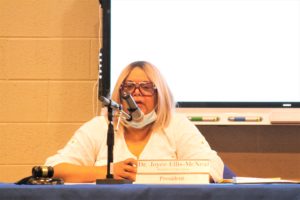
Flint Board of Education President Joyce Ellis-McNeal. (Photo by Tom Travis)
- Allen Gilbert, trustee: “In my mind, schools will have to be closed … The only enemy that we have in this city is that we’re not willing to take on the tough tasks of making the tough decisions.”
- MacIntyre: “This whole discussion of closing schools … was a mandate from the state. It was a requirement … under the Financial Emergency Manager Law which has done our communities in the state of Michigan so wrong for so many years. The EDEP … was one of the stages of the Financial Emergency Manager Law (an) antiquated, draconian law … We’re being extorted as a district.”

School Board Treasurer Laura MacIntyre. (Photo by Tom Travis)
- DelMorone: “Sometimes you need to close buildings because of the dramatic loss of population … If a decision was to be made about closing a school, or schools … we needed input from the public … I’ve learned some things from the public.”
“Legal battle of our life”
Intra-board tension dominated the final hour of the six-hour meeting. It began with a proposed motion by McIntosh seeking pay for an attorney assisting Charis Lee, the district’s new legal counsel.
“We’re in the middle of the legal battle of our life,” McIntosh explained.
Prolonged exchanges between the board’s top two officers, McNeal and McIntosh, devolved into tense exchanges and name-calling. Some of the dialogue:
- McNeal: “If you’re going to represent me, I need to see who you are.”
- McIntosh: “I’m trying to get this attorney we voted for paid … He’s not getting paid.”
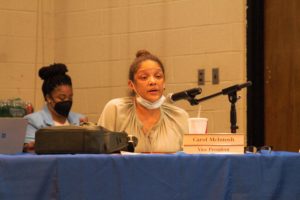
Flint Board of Education Vice-President Carol McIntosh. (Photo by Tom Travis)
- McNeal: “We do need proof of work. But we got to stop this … people putting anything on an invoice … If we do it for one, we got to do it for all.”
- McIntosh: “He showed up in court, so we can back it up.”
- McNeal: “I don’t know that.
- McIntosh: “The court know.”
- McNeal: “You got to get me some correspondence. I don’t know what you’re doing … We need some backup to what you’re saying … I like to have documents.”
- McIntosh: “We’re having a hard time with the communication from legal and the board … It was a time with myself and Ms. Green (FBOE member Danielle Green) whenever legal gave out an opinion or anything dealing with the district legally, they sent the emails to the entire board. Suddenly, we don’t get that anymore … I want to hear from legal on several issues.”
- McNeal: “What I’m saying … is Ms. Lee (district’s counsel), according to policy, responds to the (board) president and the superintendent.”
- McIntosh: “She’s the board’s attorney … You just don’t want us to hear. Why you lying?”
- McNeal: “There’s nothing that I know that she (Lee) has done that I don’t want you to hear.”
- McIntosh: “Then why everybody can’t get the emails like you do?”
- McNeal: “What emails?”
- McIntosh: “Whatever she sends you … When you lying we don’t interrupt.”
- McNeal: “This board has been charged with threats, conflict of interest, intimidation, working in a hostile environment … It is my responsibility to look after everyone … I don’t know who’s lying and who’s telling the truth … I had to go and find a factfinding investigation … I had to get a third party … to do this investigation to keep us out of litigation … I’m trying to work this thing out … The investigation is going forth; I’m going to bring it before the board.”
- McIntosh: “When?”
- McNeal: “I just told you, I just got the information back … You shouldn’t be (copying to) everybody.”
- McIntosh: “Why not? If the president does an investigation, she’s supposed to bring that before the whole board. Furthermore, if you gonna have a meeting with the board attorney, and you done decided by yourself, just you and Kevelin (FCS superintendent)? You done make them decisions by yourself?”
- McNeal: “You’re twisting all up.”
- McIntosh: “I ain’t heard nothing about this investigation.”
- McNeal: “I just detailed to you, when I got this information, I did legally what I thought I should do … I just needed to know what I do.”
- McIntosh: “We do. What do we do?”
- McNeal: “What we do as a board.”
- McIntosh: “But we don’t know nothing about it.”
- McNeal: “You’re going to get it. Everything doesn’t just happen like that overnight … I just got in this seat; I didn’t ask for it … What do I do?”
- McIntosh: “Lean on your board … When you decide to fact-find, you’re supposed to share that with us.”
- McNeal: “You going to have to do it your way; I’m doing it the way I understood it.”
- McIntosh: “Those are the rules. Transparency is part of the rules … You can’t … making decisions to investigate, to fire people, and to hire people … There’s a lot of illegal activity been going on. Furthermore, I don’t trust you … We have a right to hear the opinion from the attorney for the district, all of us at the same time. Cuz you might mess it up … Why everything a big secret ‘til it’s time to vote?”
After an hour of interruptions, muttering under breaths, and raised voices, McIntosh’s motion was passed by a 4-2 vote of the board. McNeal and MacIntyre voted against the motion.
In the meantime, multiple existential crises faced by Flint Community Schools remain unresolved.
The public tete-a-tete seemed to originate during discussions about legal matters with the district’s counsel during closed sessions. “We discussed it during closed session,” McIntosh confirmed at the start.
The public and the press are left to speculate about the particulars of the McNeal-McIntosh fallout as ongoing litigation is discussed in closed sessions, not subject to provisions of the Open Meetings Act. Nonetheless, FCS legal machinations are plentiful:
- FCS has been sued by its two most recent, former superintendents – Derrick Lopez and Anita Steward – who were abruptly dismissed by the FBOE.
- One of two lawsuits brought against the district by the American Civil Liberties Union of Michigan likely remains unresolved.
- In Nov. 2021, the district’s new legal counsel, Charis Lee publicly alleged “unnecessary work … conflict of interest, double-bill(ing) for overtime … breach (of) fiduciary duties and overcharge(ing) for legal services” by The Williams Firm before it parted ways with the district.
- Additionally, an alleged physical assault by former FBOE president Danielle Green has, effectively, led to her exclusion from the board – the result of a PPO (Personal Protection Order) granted to MacIntyre, the alleged victim of the assault. DelMorone’s request for a legal judgment from Michigan’s attorney general about the PPO was turned down at the board’s Apr. 20 meeting.
The next scheduled meetings of the FBOE are: on May 18 (regular meeting); June 8 (Committee of the Whole/COW); June 15 (regular meeting).
Meetings take place at Accelerated Learning Academy, 1602 S. Averill Ave., Flint, MI 48503. Special meetings are frequently scheduled; interested persons should check the FCS website for information.
Meetings normally begin at 6:30 and can be seen remotely by registering, in advance, at the district’s website. Recordings of meetings can be viewed on YouTube.
EVM Education Beat reporter Harold C. Ford can be reached at [email protected]
